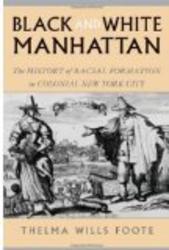Description
This book is about the history of racial formation in colonial New York City. The author, Thelma Wills Foote, discusses how race first emerged as an important ingredient of New York City's melting pot when it was known as New Amsterdam and was a fledgling colonial outpost on the North American frontier. She traces encounters between the town's inhabitants of African, European, and Native American descent, showing how racial domination became key to the building of the settler colony at the tip of Manhattan Island. During the colonial era, the art of governing the city's diverse and factious population, Foote reveals, involved the subordination of confessional, linguistic, and social antagonisms to binary racial difference. Foote investigates everyday formations of race in slaveowning households, on the colonial city's streets, at its docks, taverns, and marketplaces, and in the adjacent farming districts. Even though the northern colonial port town afforded a space for black resistance, that setting did not, Foote argues, effectively undermine the city's institution of black slavery. This book demonstrates that the process of racial formation and the mechanisms of racial domination were central to the northern colonial experience and to the founding of the United States.
Race first emerged as an important ingredient of New York City's melting pot when it was known as New Amsterdam and was a fledgling colonial outpost on the North American frontier. Thelma Wills Foote details the arrival of the first immigrants, including African slaves, and traces encounters between the town's inhabitants of African, European, and Native American descent, showing how racial domination became key to the building of the settler colony at the tip of Manhattan Island. During the colonial era, the art of governing the city's diverse and factious population, Foote reveals, involved the subordination of confessional, linguistic, and social antagonisms to binary racial difference. Foote investigates everyday formations of race in slaveowning households, on the colonial city's streets, at its docks, taverns, and marketplaces, and in the adjacent farming districts. Even though the northern colonial port town afforded a space for black resistance, that setting did not, Foote argues, effectively undermine the city's institution of black slavery. This history of New York City demonstrates that the process of racial formation and the mechanisms of racial domination were central to the northern colonial experience and to the founding of the United States.
